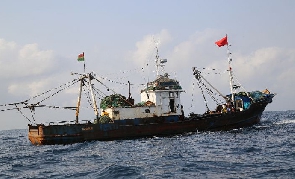Illegal and unregulated fishing poses a grave danger to the country’s predominant artisanal fishing industry which is a source of employment for the majority of the communities dotted across the coast.
According to estimates, nearly US$300 million is lost per annum to these activities which do not only deplete the country’s fisheries stock but also increase the risk of driving local fisherfolks out of employment.
The practice is one of the drivers for a new Fisheries Act which government is betting on to help tackle some of the problems inherent in the sector.
According to governmenmt, a new Fisheries Act will incorporate measures to tackle unreported and unregulated fishing and prescribe stiffer sanctions against infractions of the nation’s fisheries laws.
The fisheries ministry, according to the sector minister, has also initiated processes towards the preparation of a new marine fisheries management plan for the next five years, with plans to procure four patrol vessels and a research vessel.
According to the Fisheries and Aquaculture Development Minister Mavis Hawa Koomson, these efforts are part of reforms to help the nation tackle the menace of illegal, unreported and unregulated (IUU) fishing and allied fisheries crimes.
There is no denying the fact that IUU fishing and other fisheries crimes remain worrisome due to their negative impact on fisheries resources and the loss of revenue to the state.
IUU fishing depletes fish stocks, destroys marine habitats, distorts competition, puts honest fishers at a disadvantage and weakens coastal communities, particularly in developing countries.
This paper would like to call on the government to live up to its promises of delivering a fisheries sector devoid of some of these illegal practices. This would no doubt curb the potential of job losses within the sector.
Editorial News of Friday, 14 May 2021
Source: business24.com.gh
Business24 Editorial: Illegal fishing needs lasting solution
 The cost of illegal, unreported and unregulated (IUU) fishing to the industry is estimated at US$300
The cost of illegal, unreported and unregulated (IUU) fishing to the industry is estimated at US$300
















